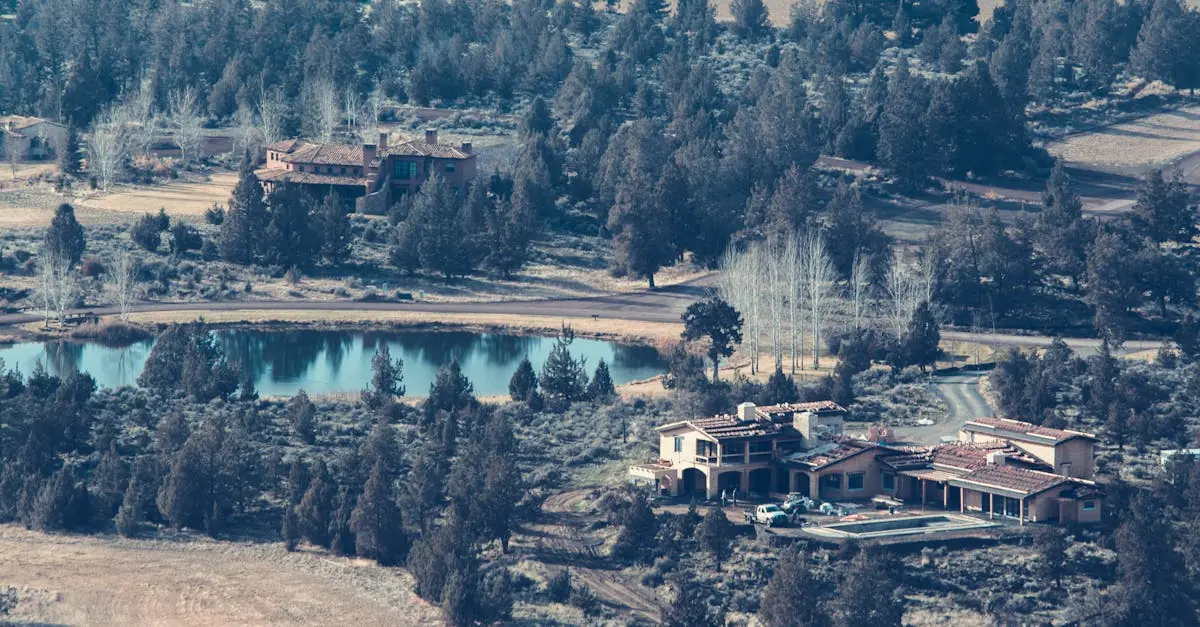In the grand tapestry of American real estate, Arizona stands out like a cactus in the desert—unique and full of surprises. From the breathtaking landscapes to vibrant cities, this state offers more than just sunshine and saguaro. It’s a hotbed for homebuyers, investors, and anyone dreaming of a slice of the Southwest.
Table of Contents
ToggleArizona Real Estate Overview
Arizona’s real estate market enjoys growth due to its diverse offerings and appealing climate. Active homebuyers find a variety of properties, ranging from urban homes in Phoenix to scenic retreats in Sedona. Investors see potential in the ongoing population increase, partly driven by those relocating from other states.
Affordability plays a critical role in Arizona’s market. The median home price sits around $450,000 as of 2023, making it competitive compared to many other states. Property taxes remain relatively low, further enhancing attraction for buyers and investors alike.
Rental demand also highlights opportunities within the state. Many residents rent, particularly in metropolitan areas, where employment rates are strong. Average rent for a two-bedroom apartment reaches approximately $1,800 monthly, reflecting economic growth. Short-term rentals thrive as tourism increases, particularly in regions like Flagstaff and the Grand Canyon.
Climate varies significantly across Arizona, influencing housing preferences. Mild winters attract many looking for year-round sunshine, while mountainous areas offer cooler alternatives. Each region showcases unique neighborhoods, catering to varied lifestyles and preferences.
Infrastructure developments continually enhance accessibility. Major highways facilitate travel across cities, while light rail expansions improve urban connectivity. Such enhancements make daily commuting smoother, increasing desirability for homebuyers.
Overall, Arizona’s real estate landscape presents opportunities for all types of buyers. Diverse housing options along with an attractive climate solidify Arizona’s position as a prime destination in the American real estate market.
Market Trends
Arizona’s real estate market showcases dynamic activity fueled by various factors. Current trends indicate a persistent growth trajectory, driven by an influx of residents. Phoenix, for example, remains a focal point with rapid urban development. The average home price of $450,000 marks a competitive yet attainable entry for many buyers. Additionally, the rental market flourishes, highlighted by average monthly rates of approximately $1,800 for two-bedroom apartments.
Future predictions suggest continued expansion in Arizona’s housing market. Analysts foresee sustained demand due to ongoing population growth and limited inventory. Rising interest rates may slightly temper the market; however, affordability remains an appealing factor. Cities like Tucson are expected to evolve, offering more options to buyers. The enhancement of infrastructure will further boost market accessibility, reinforcing Arizona’s status as an attractive locale for homeownership and investment.
Property Types
Arizona’s real estate sector features a wide variety of property types catering to diverse needs and preferences. Residents, investors, and businesses find appealing options throughout the state.
Residential Properties
Single-family homes dominate the residential market, especially in urban areas like Phoenix and Tucson. Many buyers seek townhomes and condominiums, drawn by low maintenance and community amenities. Luxury properties are abundant in scenic locations such as Sedona and Scottsdale, attracting affluent buyers. This sector benefits from a steady demand, with the median home price hovering around $450,000. Rising population trends contribute to the appeal, creating opportunities for first-time homeowners and investors alike.
Commercial Properties
Commercial real estate includes office spaces, retail establishments, and industrial zones, reflecting market diversity. In urban centers, office buildings cater to growing tech companies and startups, prompting commercial growth. Retail spaces see steady activity, aided by local and national brands establishing a foothold. Industrial properties benefit from Arizona’s strategic location, facilitating logistics and distribution. Data shows the commercial market remains vital due to increasing demand, projected population growth, and ongoing infrastructure developments.
Key Locations
Arizona features several key locations that significantly contribute to its real estate market appeal. Each city offers unique attributes, attracting various buyers and investors.
Phoenix
Phoenix stands out as Arizona’s largest city, experiencing rapid growth and urban development. The bustling metropolitan area boasts a thriving job market, with technology and healthcare sectors leading the way. Residents appreciate the warm climate and numerous recreational opportunities, including hiking and golfing. Median home prices reflect its popularity, averaging around $450,000 in 2023. The rental market is equally strong, with two-bedroom apartments averaging approximately $1,800 monthly. Phoenix’s diverse neighborhoods cater to families and young professionals alike, making it an attractive destination for homebuyers.
Tucson
Tucson offers a different ambiance, with its rich cultural heritage and stunning desert landscapes. The city appeals to those seeking a more laid-back lifestyle while remaining close to nature. Median home prices are generally lower than Phoenix, making it an affordable option for many. It also features a growing arts scene and educational institutions, such as the University of Arizona. Tucson’s real estate market is evolving, providing ample opportunities for buyers and investors. A range of properties, from historic homes to modern developments, meets diverse preferences. The city’s emerging rental market shows potential, with rental rates gradually increasing as demand rises.
Investment Opportunities
Investment opportunities in Arizona’s real estate market are diverse and profitable. With an influx of residents, demand for rental properties continues to rise.
Rental Properties
The state’s growing population drives a flourishing rental market. Average rents for two-bedroom apartments in major cities, such as Phoenix, are around $1,800 monthly. Investors find multifamily units particularly appealing, offering steady cash flow. Phoenix neighborhoods, known for their amenities, attract young professionals and families seeking rentals. Additionally, Tucson’s lower median home prices present a unique opportunity for landlords aiming to cater to budget-conscious tenants. As economic growth continues, the demand for rental properties is likely to remain strong, ensuring robust returns.
Flipping Houses
Flipping houses has gained popularity in Arizona due to rapid urban development. Investors target homes needing renovations, particularly in emerging neighborhoods. Market conditions, including rising prices and limited inventory, support profitable flips. Areas like Phoenix and Tucson show significant appreciation, enhancing potential returns. With solid knowledge of local trends, investors can maximize profits from successful renovations. Attention to design and quality renovations also attracts buyers seeking move-in ready homes, driving sales and profitability in the flipping market.
Arizona’s real estate market stands out as a vibrant landscape filled with opportunities. Its unique blend of stunning scenery and urban growth attracts a diverse range of buyers and investors. With a steady influx of new residents and a variety of properties to choose from, the state’s market is poised for continued expansion.
Affordability remains a key factor driving interest in both residential and commercial sectors. As cities like Phoenix and Tucson evolve, they enhance their appeal with improved infrastructure and diverse housing options. The future looks bright for Arizona’s real estate, making it an enticing destination for those looking to invest in a thriving market.








